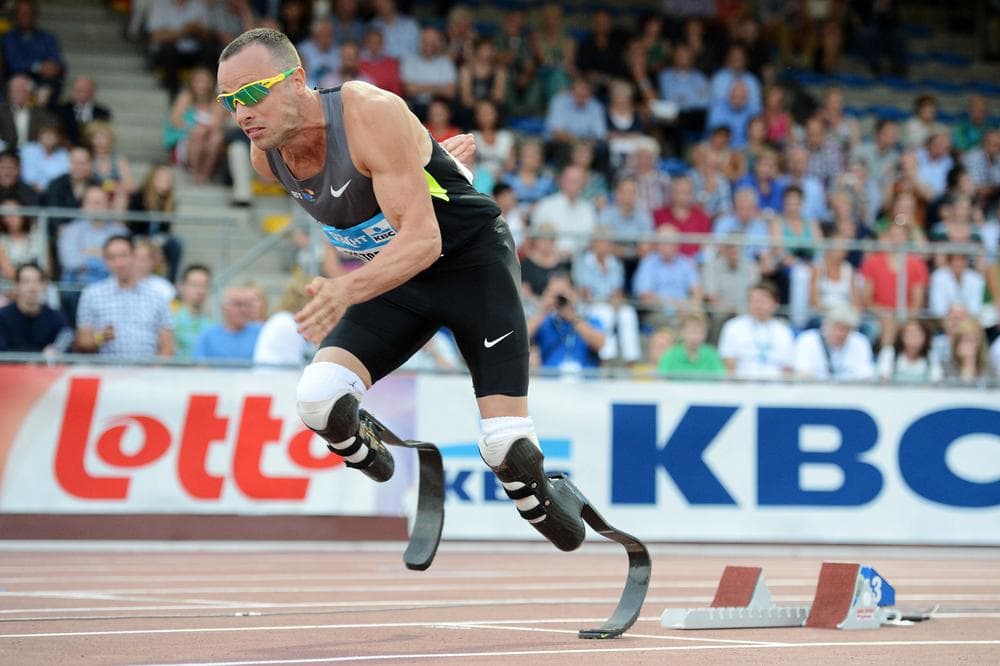Advertisement
In Depth
Oscar Pistorius: Right To Run Rooted In Science
Resume
The crowd erupted at the sound of his name, and Oscar Pistorius, wearing the green of South Africa, flashed a shy smile. It was the 200-meter final of the 2008 Beijing Paralympics, and Pistorius crossed the finish line more than a second ahead of his nearest competitor. He paused to accept a quick congratulatory hug, and then looked like he was ready to get back to business. This was only the second of three gold medals he won at those games.
Oscar Pistorius isn't used to losing. Or at least he wasn't until the IAAF, the international governing body for track and field, ruled that he could not compete against able bodied runners in his Flex-Foot carbon-fiber blades, engineered to resemble the hind legs of cheetahs. In London on Wednesday, five years after the ban and four years after it was overturned, Pistorius still sounded bitter.
"If this was such an amazing piece of equipment that's been around for 14 years, then how come thousands of other Paralympic athletes aren't breaking world records and challenging you know a 45- or 48- or 49-second 400 meter?" Pistorius asked.
Pistorius also said his goal at these Games is to break the 45-second barrier. His previous best was 45:07, still nearly two seconds slower than the world record for able bodied runners. Michael Johnson set that mark back in 1999, and he's among those who feel that science still has not proven whether Pistorius has an unfair advantage.
Dr. Robert Gailey, Professor of Physical Therapy at the University of Miami Miller School of Medicine, has worked with amputees for more than three decades. For him, there is no doubt.
[/sidebar]"You only get 80 percent energy return," Gailey said. "We knew that the human foot, because it has muscles, gives you about 250% energy return, and your calves are a major energy generator. He was at a disadvantage from the beginning."
With the help of scientists like Gailey, Pistorius made his case to the Court of Arbitration for Sport (CAS) and won. He didn't run fast enough to qualify for these Olympics outright, but thanks to his inclusion on the South African 4x400-meter relay, Pistorius punched his ticket to London. Regardless of how well he does between now and the relay finals on Friday, Gailey said Pistorius has already helped to change the world.
"Oscar has broken the glass ceiling for athletes with disabilities in the respect that kids today are going to be able to see Oscar competing, and hopefully they'll be children at home and young adults saying, 'Hey listen, I've lost a limb and if Oscar can do this, maybe I can compete as well,'" Gailey said.
Or..those young people could become the scientists who build better prosthetic limbs. Like Pistorius, MIT Media Lab professor Hugh Herr is a bi-lateral amputee, but instead of running on carbon fiber blades, Herr walks on BiOMs — beautiful machines of titanium and silicon, each containing twelve sensors, three computers, and a motor that emulates the calf muscle.
"I’ll never forget the first time I felt a motorized, powered bionic ankle," Herr said. "It’s as dramatic as when you’re at the airport and you’re walking along and you hit the moving walkway and you just take off. It’s that profound of a difference."
Herr's BiOMs are not designed for running, and they wouldn't be allowed in the Olympics if they were. Herr was part of the team that testified to the CAS, and on that day, Pistorius was expressly forbidden to run on anything other than the blades that had been tested and approved.
"It’s funny," Herr said. "When I left the courtroom, one of the arbitrators, he pulled me aside and said, 'Hugh, I don’t want to see your face here for a very long time.' What he meant was, 'Do not invent anything, ‘cause I don’t want to go through this debate ever again.'"
It would take a lot more than a stern warning to keep Herr from tinkering in his lab. Dozens of prototypes litter metal shelves, many of the older models scavenged for parts to build newer machines. Herr pulled one model out for a closer look.
"Oscar Pistorius uses this carbon c-shape spring, so what we’ve done is augmented the spring," Herr said about the apparatus. "We’ve given it a muscle."
The "muscle" is a motor that pulls a cable to cock the spring, adding energy into each step and catapulting the runner off the ground. It's exactly the kind of improvement the governing bodies of sport don't want to see. But, Herr doesn't offer to strap on the device to show it off.
"I think this would require a crash helmet," Herr said. "We haven’t attached this to a human yet. It’s a little scary."
When its ready for a test subject, Pistorius might just be the guy for the job. He's known for his love of speed and danger, driving fast sports cars and crashing motorcross bikes and boats. He even owned a couple of tigers for a while.
While Pistorius seems satisfied at being limited to the prosthetics the CAS has approved, eventually someone will want to use something better. And then what, asked Dr. Bob Gailey.
"That's why you can understand the IOC's predicament," Gailey said. "Who's going to pay for the testing of all the new developments that come up? When does a prosthetic limb that's designed to just be an equalizer for competition become performance enhancement?"
These are questions that might not need to be answered right away. As science marches on, building better and faster prosthetic limbs, Gailey said athletes who have as much drive, dedication and natural talent as Pistorius are much more rare.
"We may not see another Oscar for a long, long time," Gailey said.
This segment aired on August 4, 2012.
